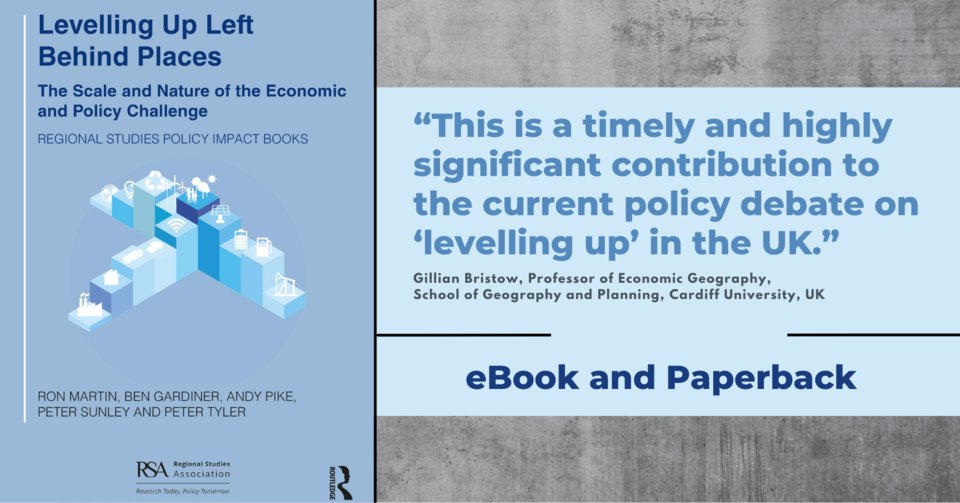Levelling-Up and Inclusive Growth: Perspectives from the North-East (book review)

By Ignazio Cabras, Network Chair of the RSA North-East Branch and Professor of Regional Economic Development and Head of the Accounting and Financial Management Department at Newcastle Business School, Northumbria University
On this date, September 27, 2023, Ignazio Cabras holds the position of RSA Territorial Representative for the North East (read more).
Northumbria University’s iNCITE research centre hosted a Regional Studies North East branch event to discuss how a national levelling-up policy might promote inclusive growth for our region. The event began with presentations from Andy Pike (Henry Daysh Professor of Regional Development Studies, CURDS, Newcastle University), Joyce Liddle (Professor of Public Leadership and Enterprise, Northumbria University) and David Goodhart (Head of Demography, Immigration and Integration Unit, Policy Exchange) before they were joined by Lucy Winskell OBE DL (Chair of the North East Local Enterprise Partnership & PVC for employability and Partnerships, Northumbria University) and Professor David Charles (Director of iNCITE) in a lively panel discussion chaired by Professor Gary Bosworth (Northumbria University).
We began by asking, “what will be levelling up look like for this region, or any other?” and “should it focus on economic growth, the better quality of life, increased education and skills, better health and transport…or a combination of all of these things?”
Andy Pike drew from the RSA Policy Impact Book “Levelling Up Left Behind Places“ to provide a statistical overview of the widening regional inequalities in the UK, noting the complexity that arises from multiple interconnected factors influencing divergent regional economic performance. Perhaps linked to this complexity, a lot of the rhetoric and investment made under the banner of “levelling-up” has been expansive. While the commitment to accountability at the national level is promising, the 12 missions do not provide the most precise indicators against which to measure performance. Indeed, many investments and initiatives that fall under the levelling-up banner would have formed part of government policy anyway, so distinguishing between new ideas and a “rebadging of policy” adds to the evaluation challenge. Nevertheless, this accountability is a critical aspect of levelling up to ensure that the strength of analysis in the White Paper is translated into the high-level diagnosis of persistent imbalances to inform the remedies required. Joyce Liddle reinforced the challenges of delivery of the levelling up white paper by drawing attention to the fragmentation of governance in the UK and the effects of policy churn on the loss of staff and expertise in local government and regional agencies.
A major topic of discussion focused on the role of higher education (HE) in supporting the region. David Goodhart’s “Head Hand Heart” thesis on the massification of HE since the 1990s stimulated exciting discussions about universities’ roles. He argued that the growing’ cognitive class’ has seen fewer career progression routes for those without degrees, describing university education as the giant ladder replacing many smaller ladders that previously allowed people to progress into higher-status jobs. Rather than critique universities, however, this should reinforce the calls for more agile and flexible modes of engagement with HE. While the residential university experience is a suitable aspiration for many young people, alternative courses that support lifelong learning can play a significant role in regions such as the North East, where the impacts of structural change can last for a generation. Joyce Liddle explained how the UK government strategy to “build-back-better” calls on universities to engage with the needs of ‘left behind’ communities in addition to working with policymakers and industry – a challenge that universities must meet through understanding the demands of employers to create the pathways and opportunities for a more diverse range of graduates.
Goodhart also suggested that the knowledge economy does not need the volume of graduates that the current HE sector is delivering. This view has perhaps been reified by the recent appreciation of essential workers in the care and retail sectors during the pandemic. Still, we must be careful not to assume that the value of the foundation economy begins calling for a reduction in knowledge economy skills. An alternative thesis is that investment in the North East has not created the right level of knowledge economy jobs, perhaps because market forces continue to drive knowledge-intensive work to the core regions. Suppose we can identify the markets where graduates can be most productive and invest in providing the regional economic characteristics to support firms in these sectors. In that case, that can give a more robust pathway towards levelling up than over-emphasising low-skilled employment.
That is not to say that the expansion of the cognitive class is not without its faults. Goodhart laments the disappointment of graduates in non-graduate jobs with high debt. He also explained how some measures indicate that social mobility has slowed down since the rapid expansion of the HE sector. Therefore, we must find a happy balance where universities remain aspirational places of educational, cultural and personal development but where other options are also valued in society. It is hard to argue with Goodhart’s stark recognition that when 10% of people went to university, they were “different”, but when over 50% of people go to university, those “left behind” are the ones who feel different. These people are not just left behind in terms of academic attainment; this translates into a geographical limit on mobility. They are also left behind by their friends who move away to enjoy the fulfilment of student life.
Perhaps we must reflect on the goals of “levelling-up” – what are we trying to level, and for whom?
In the North East, there are pretty high levels of life satisfaction, people are more embedded in the region, and there is reasonably good graduate retention from a strong HE sector. However, this coexists with lower levels of productivity and innovation than elsewhere in the UK. Suppose the aspiration for people in the North East to “stay local and go far” is to be truly delivered. In that case, headline investments in transport and digital infrastructure must translate into existing and new firms committing to the region. Only this will allow the research and innovation potential of universities, the quality of life on offer to employees and the entrepreneurial potential for new start-ups to be realised.
A focus in the past on creating low-skilled jobs has reinforced the problems of left-behind places due to the lack of long-term sustainability. Instead, these regions need to develop growing industries with a mix of high skills in graduate managerial and research jobs with opportunities to develop skilled manual jobs. The key focus has to be for regions to build the capacity to make their futures. For universities, this requires a redoubling of efforts to engage with industry in their region, ensuring that the right skills are nurtured among graduates and help build creative, innovative and aspirational networks across the region. Within the levelling-up missions, there is a desire to see all regions having a “globally competitive city”, and we are convinced that these cities need vital HE sectors working with their local policymakers and industry.
